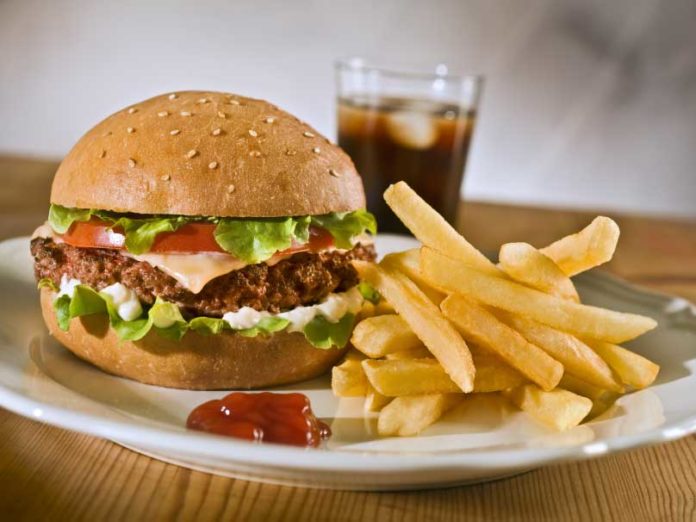With so much speculation about what might cause cancer, sometimes it can seem overwhelming.
We can never guarantee that we won’t get cancer, but we should do all we can to help our chances. One way to do that is by modifying our diets.
Cutting out these types of foods, which have been linked to cancer, may also come along with a lot of other health benefits.
1. Red Meat
We all love our steaks and cheeseburgers, especially here in the U.S. However, eating too much red meat has been linked to a higher risk of cancer, as noted by The World Health Organization. Grass-fed, organic red meat is quite an improvement, as you’ve likely read in my other articles, but should still be kept in moderation. Red meat is also high in cholesterol and saturated fat, which may lead to heart disease; so limiting your red meat intake is a good idea. Organic chicken, turkey, wild-caught salmon and plant-based proteins like black beans (think veggie burgers) are some healthier main course alternatives.
2. Grilled Meat
Now you know that red meat comes with a bit of risk. If you can’t cut out red meat entirely, at least consider changing how you cook it. Exposing fish and meat (red and otherwise) to an open flame causes it to produce “heterocyclic aromatic amines” and “polycyclic aromatic hydrocarbons,” both of which are known carcinogens.
Click here for more information from the NIH on this topic. If you don’t want to give up your backyard barbecues, you can cook at a lower heat, or flip the meat more often. Here are some more guidelines for healthier grilling.
3. Processed Meat
Here’s another important group to avoid! Even without giving up grilled red meat, you can cut down on your cancer risk by reducing your consumption of processed meats.
“Processed” is a general term used to describe efforts to preserve the meat, with most processing involving the use of sodium nitrites. Sodium nitrites combine with natural amines in the meat, and may form carcinogenic N-nitroso compounds. Examples of processed meat include: bacon, hot dogs, and lunch meat like bologna and salami. Enjoy them sparingly, if at all.
4. Farm-Raised Salmon
Salmon can be a delicious alternative to meat because it is typically low in unhealthy fats and rich in healthy fats (omega-3 fatty acids). However, as I often have discussed on this blog, animals raised in healthy, natural environments tend to be better for us nutritionally. Those whose living conditions have been modified for factory-farming type of mass output usually aren’t as beneficial. This goes for grass-fed cows, free-range chicken and also fresh-caught salmon. Farmed salmon has a much higher level of potentially cancer-causing contaminants than its wild-caught counterpart. The cheaper price of farmed salmon is not worth the health cost.
5. French Fries
Plant-based fried foods like french fries are high in a substance called acrylamide. Acrylamide, which has been shown to cause cancer in animals, is created during high-temperature cooking processes such as baking and frying.
To reduce the amount of acrylamide you ingest, never cook french fries more than the minimum directed time, and avoid eating brown or burnt fries. I suggest limiting french fries overall, because they’re high in fat and contribute to obesity, which has also been linked to cancer.
6. Baked Goods with White Flour
Foods that cause the glycemic index to spike have been linked to increased cancer risk in some types of people. These types of foods are often sugary and full of simple carbs; including cookies, cake, candy, and even just white bread or pasta.
Switching to foods that have more whole and complex grains removes the sugar spike and also cuts down your risk for obesity and other associated health problems.
7. Diet Soda
To reduce calories, diet sodas have replaced refined sugar with sugar substitutes that mimic the taste of sugar. Studies proving a link to cancer have been inconclusive, but it’s safer to avoid these sugar substitutes until they’re proven to be safe.
Plus, diet soda may still spike your blood sugar levels even more than regular soda — despite having less actual sugar. That doesn’t mean you should go back to a regular soda habit, though. Regular soda is full of empty calories and artificial additive, and it’s even bad for your teeth. Best to steer clear of soda all together.
Diet Change Success
Keep this quick list in mind next time you get hungry! I find it’s easiest for our patients to shift to a healthier diet over time, rather than try and go “cold turkey” on a certain type of food.
Rather than eliminate a certain food completely, some patients have found success with having one “cheat day” per week, where they eat as much of any food as they like. The one cheat day can even help to spark your metabolism, sort of like a reset button to your digestive system! The uncomfortable digestive feeling on the day after your cheat day will also help you stick with your diet and remind you to eat healthy.
It’s best to include the entire family in the healthy diet change. Start young kids off with a healthy diet from the start. If you keep your children’s health in your best interest, it’s easier to follow suit as healthy parents. In case you don’t have children, or they don’t live with you, look for ways to include others in your new diet. You could ask neighbors or friends to join you, or look for support forums online to swap stories.
—
Photo credit: Noam Armonn / bigstock.com








